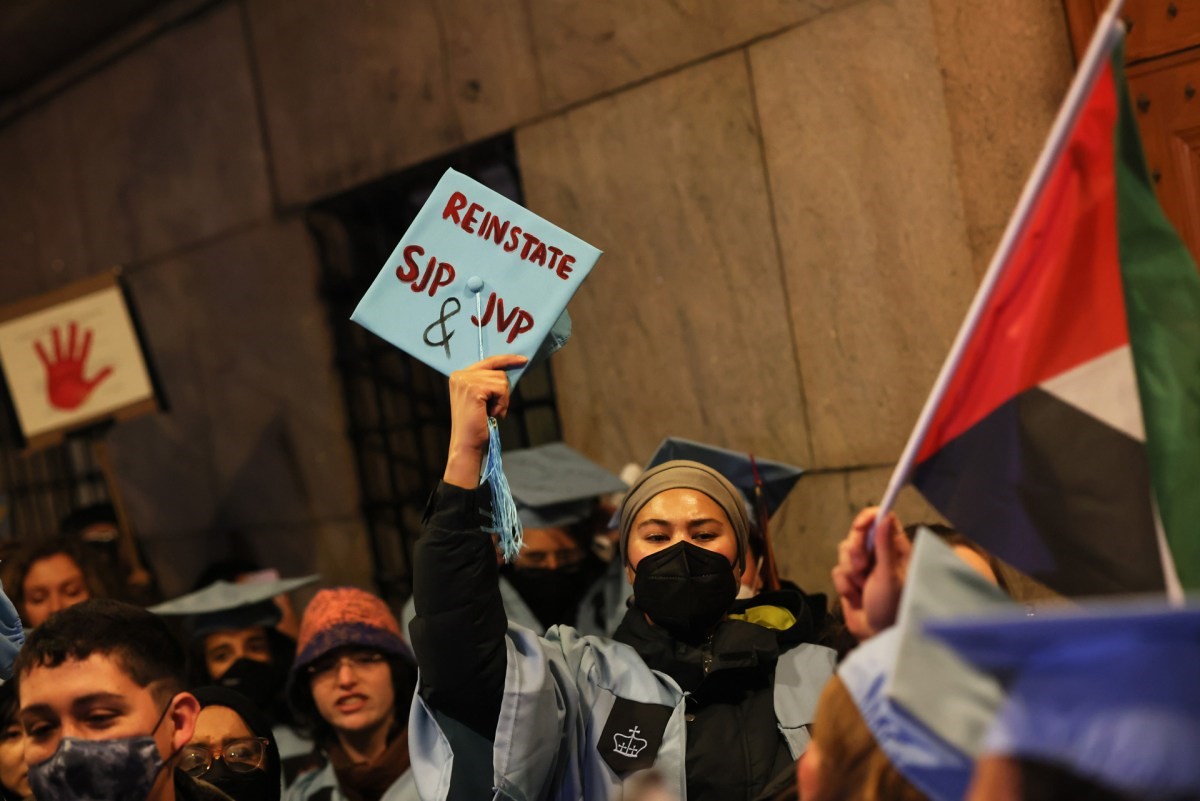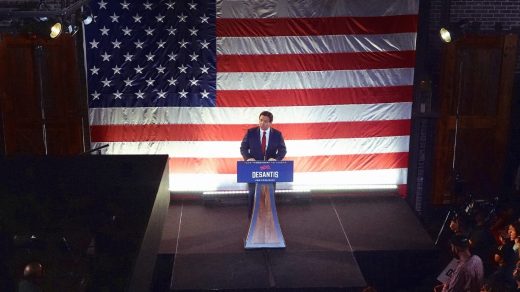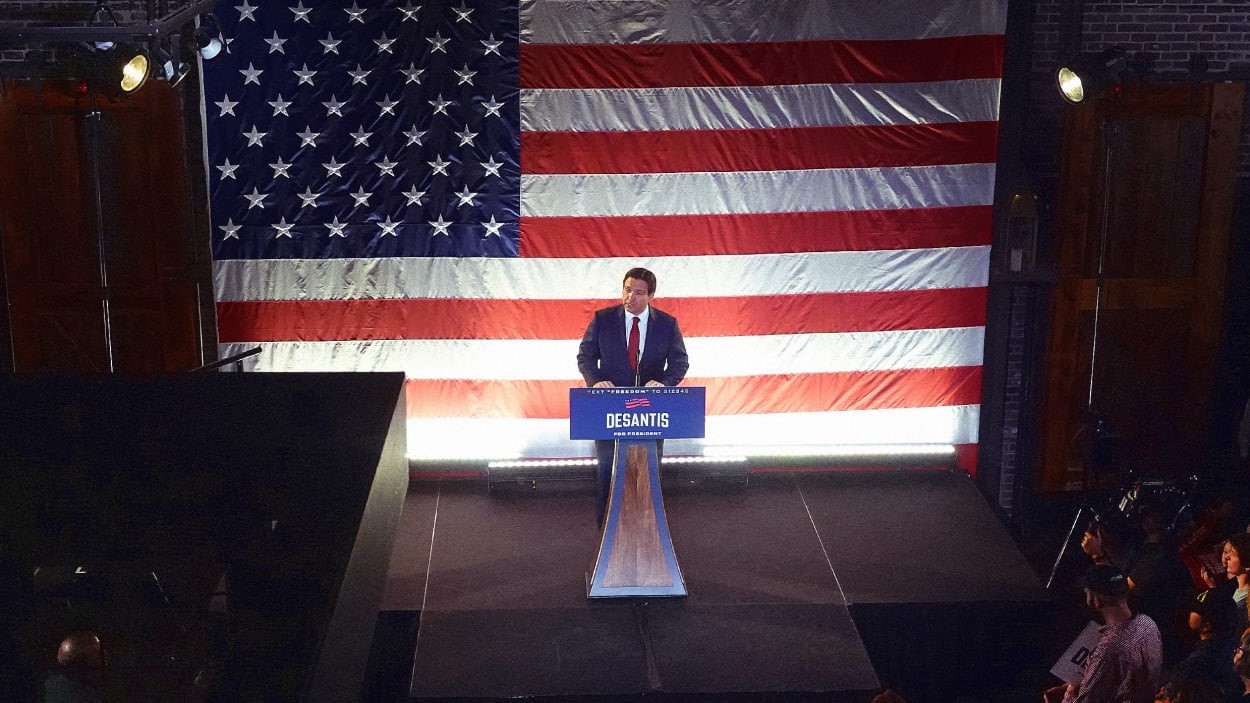Palestinian protests are just the latest way Ron DeSantis is cracking down on free speech in Florida
By Talib Visram
Less than two months out from the Iowa caucuses, which kicks off the presidential primary season, Ron DeSantis may be starting to panic.
Once viewed by GOP leaders as the party’s next great hope, the Florida governor picked up the coveted endorsement of Iowa Governor Kim Reynolds a few weeks ago, but it’s done little for his popularity. In the state, his paltry 18% trails behind Donald Trump’s 54%.
Since his presidential ambitions became clear last year, DeSantis has used his home state as a proving ground of his ability to pass a flurry of legislative policies that appeal to a far-right base. Now, as war in the rages in the Middle East, causing a devastating humanitarian crisis in Gaza, he’s using that conflict to fuel his latest political stand in Florida.
This time, he’s taken on a formidable opponent: the First Amendment. As students’ calls for a ceasefire increase at Florida’s public colleges and universities, DeSantis ordered one activist group, Students for Justice for Palestine (SJP), to be suspended, which would make terminate their access to university resources. A new lawsuit filed against DeSantis claims that’s a violation of freedom of speech. For higher education faculty in Florida, the governor’s latest action is yet another example of his authoritarian playbook, and his desire to score political points as he runs for president.
After Hamas’s October 7 attack, Israel has countered with continuous air strikes and a ground invasion in Gaza, estimated to have killed 11,000 Gazans—including 5,000 children—about one in every 200 people in a land area about the size of Las Vegas. In response, there have been rallies of record attendance around the globe demanding a ceasefire and a “free Palestine.” That’s particularly been a trend on college campuses.
That provided fodder at the Republican debate earlier this month. The candidates tried to outdo each other in their pledges for support for Israel, with Nikki Haley committing to give the state “whatever they need, whenever they need it.” But they also discussed the atmosphere at home, all standing firm against the growing pro-Palestine rallies. DeSantis boasted that he had “deactivated” SJP in Florida. “We’re not going to use state tax dollars to fund jihad,” he said.
On October 26, DeSantis instructed Florida’s public universities to ban the SJP—one day after Randy Fine, a far-right Florida House member and the only Jewish state representative, publicly announced his switch of allegiance to Donald Trump after years of having “championed” DeSantis, explicitly rebuking the governor for allowing what he called “anti-Semitic protests.” At DeSantis’ behest, Ray Rodrigues, chancellor of the State University System of Florida, sent out a memo instructing any campuses where SJP is active to disband their chapters. (They are active at two: University of Florida and University of South Florida.)
But opponents of the move say that student groups have the right to exist and exercise free speech on public campuses. “Officially trying to deactivate a student group because they don’t like their perspective . . . is a fundamental violation of the First Amendment,” says Dima Khalidi, founder and director of Palestine Legal, an organization that protects the rights of people in the U.S. speaking up in favor of Palestinian freedom.
But Florida eliminates First Amendment protections if groups are providing “material support” to foreign terrorist organizations, a statute added under the previous Republican governor, Rick Scott, which makes it a felony. Rodrigues’ letter references a “toolkit” released by the national umbrella organization of the SJP on October 7, following the Hamas massacres, particularly the phrase: “We as Palestinian students in exile are PART of this movement, not in solidarity with this movement.” The state is asserting that section to be proof of “material support.” It was presumably this clause that led DeSantis to declare, at the debate, that “[SJP] said they are in common cause with Hamas.”

In response, the ACLU and Palestine Legal have sued DeSantis and Rodrigues, asking for a preliminary injunction against Rodrigues’ “blatantly unconstitutional” order, says Brian Hauss, a senior staff attorney at the ACLU. The lawsuit calls the chancellor’s allegation of material support “unsubstantiated,” adding there is no evidence for the claim. They also argue the SJP’s university chapters are completely autonomous organizations from the national umbrella, which does not engage in any on-campus decisions.
Khalidi and Hauss say Florida’s action clearly shows its bias on the conflict; neither Khalidi nor Hauss knows of any pro-Israel groups that have been targeted in the same way. “This is classic viewpoint discrimination,” Hauss says. Adds Khalidi: “It’s critical that we protect the right to speak on these issues—especially at a time when the national debate on this is so skewed.”
Though it’s ramped up, the suppression of pro-Palestine speech has been happening for several years. “This is not new at all,” Khalidi says. “There has been a McCarthyist-type backlash against pro-Palestinian voices,” she adds, referring to the large-scale suppression and persecution of left-wing activism during the Cold War, which frequently undermined rights to free speech.
Since it started recording data in 2015, Palestine Legal has found a history of what it calls the “Palestine exception to free speech.” In 2022, it found 214 incidents of suppression of U.S.-based Palestine advocacy, 70% of which were at colleges and schools. Since October 7, they’ve had 600 requests for legal aid to help counter such incidents. The claim that Palestinian support is linked to terrorism isn’t new either. “The tactics used to silence advocacy for Palestinian rights frequently follow recognizable patterns,” the original report reads. “Activists and their protected speech are routinely maligned as uncivil, divisive, antisemitic, or supportive of terrorism.”
University of Florida leadership has also weighed in. Some days into the Israeli counter operation, UF President Ben Sasse, a former Republican senator named to the position by a board of trustees picked by DeSantis, wrote a letter to alumni saying he would allow campus protests accordant with the First Amendment, but phrased it in a way that made his opinions clear. “Our Constitution protects the rights of people to make abject idiots of themselves,” he wrote.
So far, both universities have not taken action to enforce the SJP deactivation order, in defiance of DeSantis. But Hauss says officials could change their mind at any moment. He says it has already had a chilling effect, with some students afraid to participate. The groups worries it’ll lose privileges granted to student organizations, such as classrooms for event spaces, and the ability to communicate using the campus’ online portal, GatorConnect.
Elsewhere, SJP has lost such privileges. Columbia University, Brandeis University, and George Washington University have all suspended SJP—but they’re private schools. “As a pure First Amendment matter, all three schools are acting perfectly within their power,” says Howard Wasserman, professor of law at Florida International University. (Though, he adds, they do have codes that guard free speech in a similar manner to the First Amendment, allowing educational institutions to permit the free exchange of ideas.)

In Florida, SJP doesn’t accept state funding, rather it runs on student government funds. That means it would also be immune to SB 266, commonly known as the DEI bill, which DeSantis signed in May to crack down on diversity and inclusion initiatives in public education, which Sitharam says is just starting to roll out on campuses now. It says student groups that “advocate for diversity, equity, and inclusion, or promote or engage in political or social activism” aren’t allowed to receive state funding to maintain student programs.
Still, for educators, it’s an example of DeSantis’ assault on education in Florida, where he has implemented a string of vaguely written policies aimed at crushing what he views as “woke” indoctrination of students, including the Don’t Say Gay bill, which prohibits public schools from teaching about gender identity or sexual orientation, leading to various book bans; and the Stop WOKE Act, which outlaws instruction that could make any student feel uncomfortable, and has largely targeted discussions of systemic racism in the U.S. and its historical origins.
While Sitharam says it feels “callous” to complain considering what’s happening in Gaza, in Florida the new law is “one piece among many pieces that have been raining down upon us since 2019.” She says faculty are still leaving Florida “in droves,” and replacements aren’t coming quick enough. “It’s a bleak situation.”
It all appears to be posturing in a Republican primary that is desperate to court the MAGA base. “He’s posing as the person who actually gets things done, as opposed to Trump, who only talks about it,” she says. “He’s basically destroying the higher education system of Florida for that purpose. It’s not even clear that he necessarily believes it.”
But shutting down free speech is particularly worrying. Ironically, it’s been a talking point for conservative activists in the past few years that universities aren’t open enough to right-wing viewpoints. Christopher Rufo, who has been instrumental in ushering in Florida’s new educational landscape, including so-called “classical education,” said in August that schools should force more right-wing perspectives. “Left-wing ideologues spent the past 50 years hijacking the public universities and transforming them into vehicles of partisan activism,” he tweeted. “They want politics? Let them have politics.” Rufo has also been central in the turmoil at New College that has seen DeSantis-picked conservatives replace the board of governors at the liberal arts school.
This new model of filling schools with right-wing ideologues, and then silencing opposing viewpoints, worries Sitharam. “Our business is to provide context and educate people, without taking sides,” she says, especially in the context of the Israel-Palestine conflict that is so complex and nuanced. DeSantis’ playbook is shutting down the ideas it doesn’t want people to hear. “Really, it’s code for saying: ‘Let’s have less of the other stuff,’” she says. “It’s not about increasing representation. It’s about shutting down other representation.”
(20)



